New phonics test will help teachers see who’s guessing, not decoding
5 Replies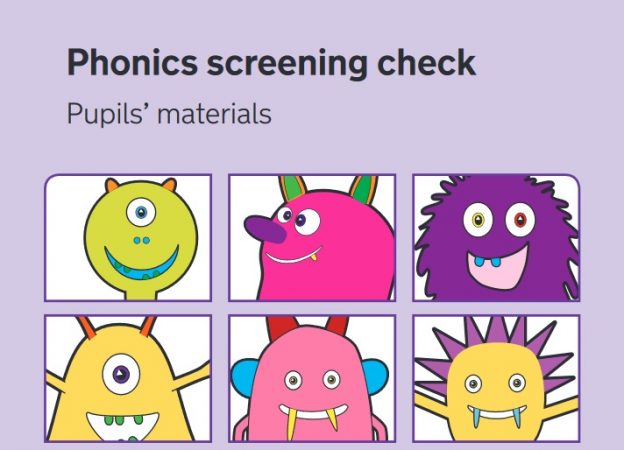
Federal Education Minister Simon Birmingham has announced that once they’ve been at school for 18 months, he’d like all children to do a short, class-teacher-administered phonics test.
Loud protests, of course. Not another mandatory test, etc. But I agree with his advisors that this short, simple test will be a good thing. I’m optimistic that once it draws teachers’ attention to not-currently-obvious gaps in their students’ reading knowledge, they’ll move to fill them.
Who asked for this test, and why?
This test is largely the result of lobbying by parents, concerned teachers and others because of the gap between research and practice in early literacy teaching, and the unnecessary failure and suffering that results.
This is a big problem for teachers as well as children. Teachers lose a lot of sleep over children in their classes who just keep falling further and further behind in reading, and who they’re not adequately trained or equipped to help.
The new phonics test, based on one currently used in the UK, would be designed to help teachers quickly and easily identify children who aren’t sounding out (decoding) words well. This is the first step towards helping them. (more…)
New early literacy skill assessment service
3 Replies
It’s often very confusing for parents to work out whether to be concerned about their young child’s reading and writing skill development.
If the parents I talk to are reliable informants, advice from schools often goes like this:
- Age 5-6: Yes, your child is taking a while to catch on to reading and writing, but let’s wait and see, she could just be a “late bloomer”. Just keep reading predictable texts and encouraging her to look at the pictures and guess, memorising high-frequency words etc.
- Age 6-7: Your child will be attending individual or small group intervention, for more intensive activities of the type that didn’t work last year, e.g. Reading Recovery or Leveled Literacy Intervention.
- Age 7-8: You need to pay a Psychologist $1000+ for a comprehensive cognitive and educational assessment, because we think your child might be dyslexic. If she is, you’ll have to pay a tutor to help her, because the school spends all its literacy intervention money on the program for 6-7 year olds.
I’m really tired of hearing this story, and aware that the “late bloomer” is usually on a path to failure, so I want to provide parents with earlier, more evidence-based advice. However, I’m too busy to offer a new service myself, so I’ve hired another Speech Pathologist, Nicole Erlich, to offer a reading/spelling assessment package for 6-8 year olds that’s fairly quick, focuses on the things that matter most for beginners, and doesn’t cost the earth. (more…)
The difference between research and marketing
0 Replies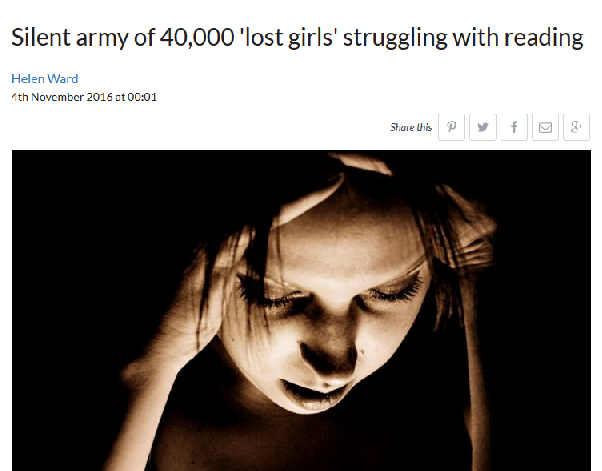
A recent TES article says a new UK report reveals a “Silent army of 40,000 ‘lost girls’ struggling with reading”.
Great, attention-grabbing headline. Shades of Boko Haram. But we already know that many girls can’t decode, or can’t comprehend language very well, or have both problems.
There are fewer struggling girls than struggling boys, and girls are more likely to shrink into themselves than attract attention by behaving badly when they’re struggling. But struggling girls exist in schools everywhere, which should already be identifying and assisting them.
An over-reliance on phonics?
What made me sit up and pay attention in the TES article was its statement that the report it discusses “suggests that an ‘over-reliance on phonics’ is obscuring deeper problems with reading in primary schools – where children can read words but may not understand them”. (more…)
The UK Phonics Check could help reduce teacher workloads
10 Replies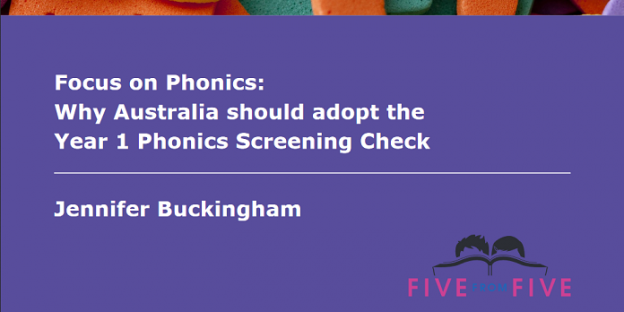
There’s an article in yesterday’s Age newspaper about a proposal from literacy expert Dr Jennifer Buckingham for compulsory use of the UK Phonics check with Australian first grade children. Rather than trying to paraphrase it, I encourage you to read the proposal yourself, it’s in plain English and based on a motza of scientific evidence.
Any teacher, school or interested person can already use the UK Phonics Check. It’s quick, free, simple, downloadable and a useful assessment of early reading skills. Some Australian schools already use it. Click here for the 2016 version.
The test asks children who’ve had about 18 months of literacy instruction to read 20 real words like “chin”, “queen” and “wishing”, plus 20 made-up words like “doil”, “charb” and “barst”.
Since its introduction in England in 2012, the proportion of children passing the Phonics Check has increased each year, and the proportion of children below the expected standard on Year 2 reading tests has fallen by a third. The achievement gap between wealthier and poorer students has also narrowed. Yay to that. (more…)
Is the new Victorian learning difficulties screening assessment any good?
14 Replies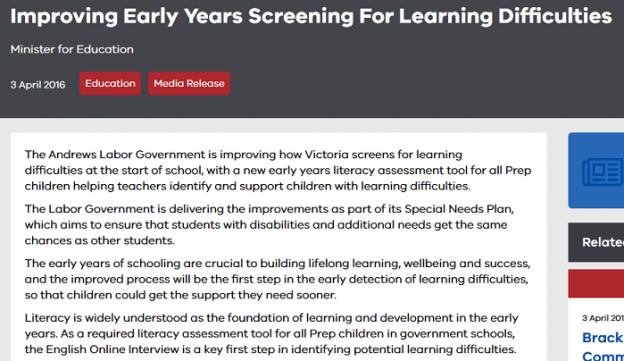
From the end of this year, all children starting school in this state will be screened for learning difficulties.
The Minister’s media release says, “…the improved process will be the first step in the early detection of learning difficulties, so that children could get the support they need sooner” and that the policy means “properly supporting students with additional learning needs so they get the opportunity at a great education.” (Does poor grammar in the Minister for Education’s media releases make you feel a bit despairing, too?)
A useful free online document called Selecting Screening Instruments explains why school entry screening is a worthwhile thing to do: “The goal of universal, early reading screening is to identify children at risk of future failure before that failure actually occurs. By doing so, we create the opportunity to intervene early when we are most likely to be more effective and efficient. Therefore, the key to effective screening is maximizing the ability to predict future difficulties”.
What are the features of a good early reading screening test?
A good early reading screening test measures things that matter over time (i.e. is valid and predicts well) and gives consistent results (i.e. is reliable).
It sorts out the kids who are going to be fine from the kids who are going to struggle, without too many false positives (worrying about kids who are actually going to be fine) or false negatives (failing to identify kids who are actually going to struggle).
It has norms which allow any child’s performance to be compared with the typical performance of their peers. (more…)
How can I get my child’s literacy problem taken more seriously at school?
27 Replies
A parent from the Dyslexia Victoria Support Group tells me the title of this blog post is one of the main questions asked on their Facebook page.
Sad, eh? But teachers are good people, and the system fails them too. How frustrating to have kids in your class who you’ve never been taught how to teach to read/spell, year after year! So let’s just get on with fixing this problem, so we can put this question out to pasture.
Normalising failure
Most teachers are taught and equipped to teach early literacy in ways that set up around 20% of students to fail. The most common approach is called “Balanced Literacy“, a dog’s breakfast of approaches that contradict each other, don’t make much linguistic sense and aren’t based on the best evidence.
Years of “Balanced Literacy” and its even-worse predecessor, “Whole Language”, in our schools mean that it’s now considered completely normal for about one in five children to not learn to read for a whole year or more, despite trying their hardest. As Dr Louisa Moats says, we need to be outraged about this. (more…)
Helping teenagers with literacy
10 Replies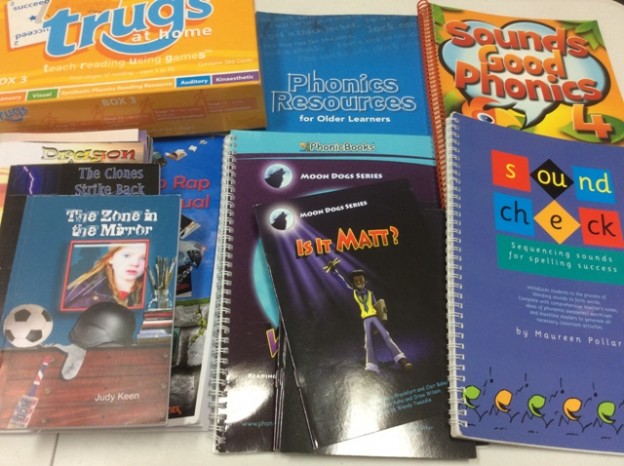
The other day our state Education Minister announced $72.3 million extra dollars will be spent over four years helping struggling secondary students, specifically kids who haven’t met Year 5 NAPLAN benchmarks.
Woo hoo to that, I say. But if it’s spent on doing the same sorts of things that didn’t work in primary school, it will be a waste.
Secondary school students with poor decoding skills and very little ability to spell generally need a good initial blast of synthetic phonics to build their awareness of sounds in words and knowledge of spelling patterns, followed up by work on vocabulary, comprehension and fluency. I’ve been doing this type of work for 14 years, in conjunction with the world’s most fabulous integration teacher and aides. We’re yet to find someone we can’t teach to read, including students with intellectual disability, language disorder and English as a second or third language.
Here’s roughly what I’d do and buy if I were a decision-maker in a secondary school with a number of students who have encoding/decoding difficulties.


